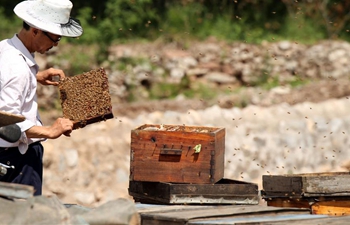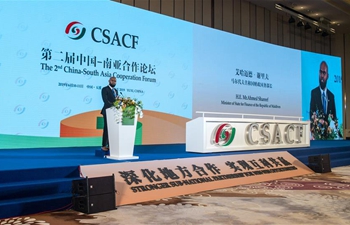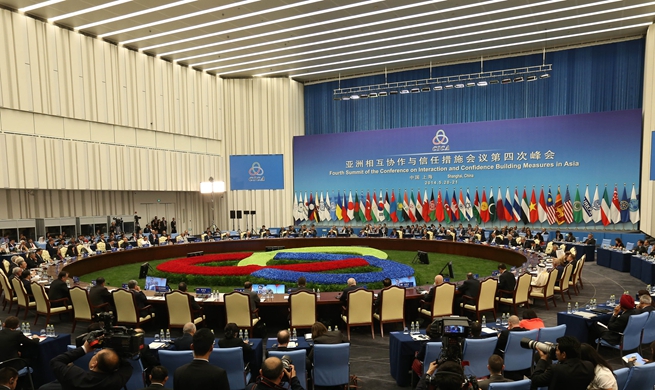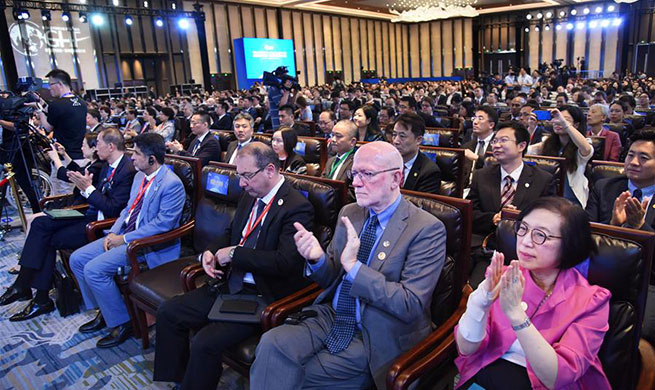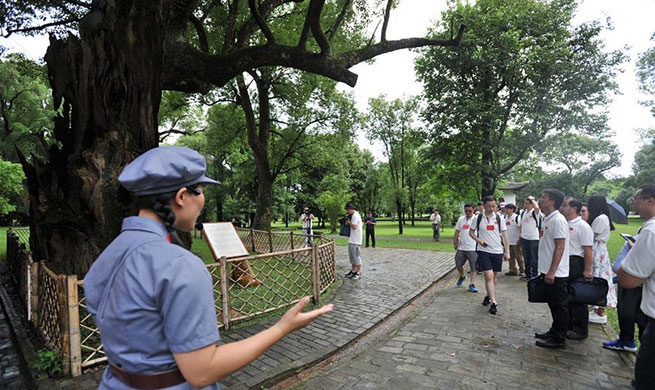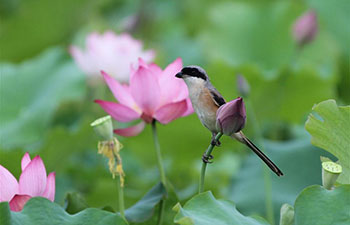LONDON, June 11 (Xinhua) -- A two-year-old Asian elephant calf described as a wonderful little fighter has beaten the odds and survived a deadly virus at Chester Zoo.
The young calf, named Indali Hi Way, has made a full recovery, from the highly lethal EEHV illness, also known as elephant endotheliotropic herpesvirus, that is threatening Asian elephants globally.
Indali is thought to be a rare case of an Asian elephant surviving the lethal virus. She is being carefully monitored by a large team of specialists at the zoo as EEHV remains a deadly virus, and zoo conservationists are wary of the possibility that the disease might return in the future.
Her successful fight for life and recovery was described at the zoo as a momentous, historic step for the zoo and for global Asian elephant conservation.
Conservationists hailed the ground-breaking developments in early detection and treatment methods, developed in partnership with the Animal and Plant Health Agency and the University of Surrey, which enabled the team to save the young calf's life.
Keepers, vets and scientists were able to detect the virus earlier than ever before at the zoo, thanks to high tech, on-site blood testing techniques. This enabled specialists to begin treatment before Indali showed any outward signs of illness.
During an intensive two-week period, Indali received round-the-clock care to help her fight for her life: including nine anaesthetic procedures, blood plasma transfusions, interferon therapy, anti-viral medications and immune boosting treatments as well as very large amounts of intravenous fluids.
On 2 April 2019, treatments ceased as experts believed she had entered a recovery phase. Now, after closely monitoring her for two months since treatment finished, conservationists at the zoo have declared her recovery complete.
During her recovery phase, keepers at Chester Zoo have been helping Indali and the herd return to a normal daily routine. The team has observed that Indali has benefitted greatly from the comfort of reconnecting with the rest of the close-knit family herd.
She has spent much of her time with her mom, Sundara, and can often be seen playing with her 18-month-old half-brother, Anjan. The rest of the multi-generational herd also closely supports Indali, including her grandmother, Thi.
Said the spokesman at Chester Zoo: "EEHV is a major threat to the long-term survival of endangered Asian elephants. Reports of wild elephant fatalities in India, Nepal, Myanmar and Thailand are on the rise.
It is known to have caused deaths in nine countries across their native range, as well as in zoo breeding programs worldwide."
It is thought most Asian elephants carry EEHV, but only young calves tend to develop outward symptoms, typically around weaning age. When they do, it is usually fatal.
A team from Chester Zoo, the APHA and the University of Surrey, backed by more than 306,000 U.S. dollars in public donations to the zoo, has been at the forefront of attempts to find a solution. The ultimate goal is to develop an effective vaccine that could be rolled out worldwide.
Chester Zoo CEO Dr Mark Pilgrim said: "Asian elephants are an endangered species and a world without them is unthinkable. We cannot underestimate the threat EEHV poses to their future survival.
"Her recovery is a major milestone for conservation. Only two years ago, the global search for a solution to the EEHV crisis looked unlikely to bear fruit. Now, there is light at the end of the tunnel."
Pilgrim said although the zoo is still unable to grow the virus in a lab, its team is exploring new avenues of biomedical science to bring the development of a vaccine closer.
Pilgrim added: "We are eternally grateful to the incredible work of the Animal and Plant Health Agency and experts at the University of Surrey, who have been battling against EEHV side-by-side with us for many years now. Indali would not be alive today without this conservation partnership.
Professor Falko Steinbach from the School of Veterinary Medicine at the University of Surrey said:
"A lot remains unknown about EEHV; with fewer than 50,000 Asian elephants left in the wild it is important that we find answers. Indali's recovery is wonderful news, and we will use what we have learnt from her case to help us find solutions against this deadly virus."




